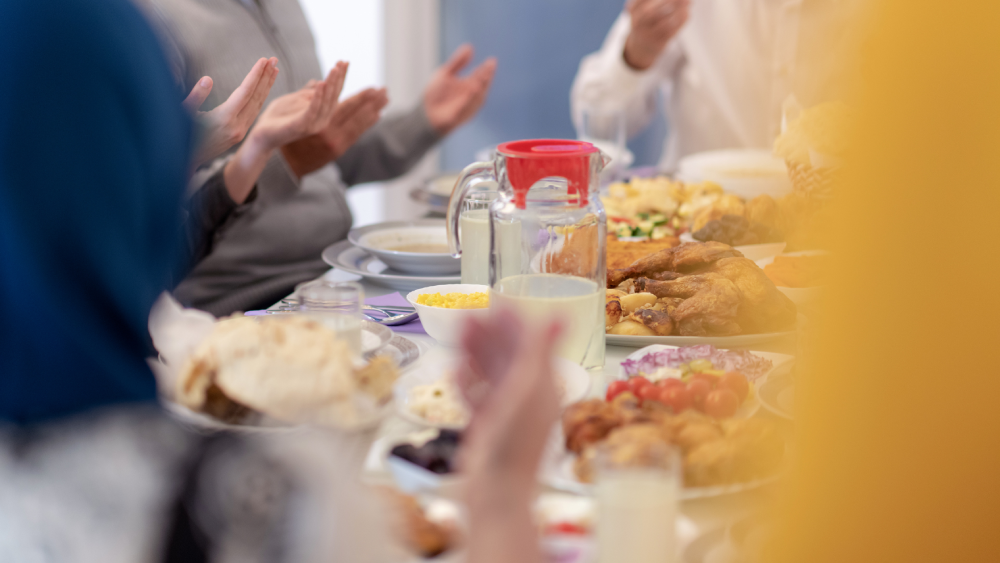
Ramadan, the ninth month of the Islamic lunar calendar, is a time of spiritual reflection, self-discipline, and heightened devotion for Muslims worldwide. Fasting from dawn till dusk is a central tenet of Ramadan, observed as an act of worship and self-purification. However, the fasting period can also present challenges, particularly when it comes to maintaining optimal health and nutrition.
Understanding the Impact of Fasting
During the fasting hours, your body utilizes stored energy reserves for fuel. While this can lead to some weight loss, it’s crucial to remember that depriving yourself of essential nutrients can have negative consequences. Potential issues include fatigue, dehydration, constipation, and difficulty concentrating.
Observing Muslims abstain from food, drink, smoking, and marital relations from dawn (Fajr) until sunset (Maghrib). This period of abstinence extends from the first light of dawn until the sun has completely set.
The pre-dawn meal, known as Suhoor, provides an opportunity to fuel the body for the day ahead, while the evening meal, or Iftar, breaks the fast after sunset. Both meals play pivotal roles in sustaining energy levels, maintaining hydration, and promoting overall well-being during Ramadan.
Healthy Eating Principles During Ramadan
- Balanced Nutrition: Optimal nutrition during Ramadan entails consuming a balanced diet that encompasses all major food groups: carbohydrates, proteins, fats, vitamins, and minerals. Incorporating a variety of nutrient-dense foods ensures adequate intake of essential nutrients despite the shorter eating window.
- Hydration: Hydration is paramount, especially during fasting hours when fluid intake is restricted. Aim to drink plenty of water during non-fasting hours, including Suhoor and Iftar, to prevent dehydration and support bodily functions.
- Moderation: While it can be tempting to indulge in lavish feasts during Iftar, moderation is key to maintaining health and avoiding digestive discomfort. Opt for smaller portions and savor nutrient-rich foods to satisfy hunger without overburdening the digestive system.
- Whole Foods: Emphasize whole, minimally processed foods such as fruits, vegetables, whole grains, lean proteins, and healthy fats. These foods provide essential nutrients, dietary fiber, and sustained energy, promoting satiety and overall health.
Meal Planning Strategies for Ramadan
- Suhoor: Start the day with a balanced Suhoor meal comprising complex carbohydrates, lean proteins, and healthy fats to sustain energy levels throughout the day. Examples include oatmeal with nuts and fruit, whole-grain toast with avocado and eggs, or yogurt with granola and berries.
- Hydration: Prioritize hydration by drinking plenty of water and incorporating hydrating foods such as watermelon, cucumbers, and soups into Suhoor and Iftar meals.
- Iftar: Break the fast with a light snack such as dates and water, followed by a balanced meal that includes sources of carbohydrates, proteins, and vegetables. Opt for grilled or baked dishes instead of fried foods, and incorporate a variety of colorful vegetables to maximize nutrient intake.
- Snacks: Incorporate nutritious snacks between meals to maintain energy levels and prevent overeating during Iftar. Examples include fresh fruit, nuts, yogurt, hummus with vegetables, or homemade smoothies.
Dietary Considerations and Health Tips
- Blood Sugar Management: Monitor blood sugar levels and choose low glycemic index foods to prevent spikes and crashes in energy levels. Incorporate complex carbohydrates such as whole grains, legumes, and vegetables into meals to promote stable blood sugar levels.
- Physical Activity: While intense exercise may be challenging during fasting hours, aim to engage in light to moderate physical activity before or after Iftar to promote circulation, digestion, and overall well-being.
- Supplementation: Consider consulting with a healthcare professional regarding the use of supplements, particularly for nutrients that may be lacking in your diet during Ramadan, such as vitamin D, calcium, and iron.
- Sleep Hygiene: Prioritize adequate sleep and restorative rest to support overall health, cognitive function, and emotional well-being during Ramadan. Maintain a consistent sleep schedule and create a relaxing bedtime routine to facilitate quality sleep.
Sample Meal Plans and Healthy Recipes Tailored for Ramadan
Suhoor Meal Plan
Option 1:
- Whole grain toast topped with avocado slices and poached eggs
- Greek yogurt with honey and mixed berries
- Hydration: Water, herbal tea
Option 2:
- Oatmeal cooked with almond milk, topped with sliced bananas, nuts, and a drizzle of honey
- Boiled eggs
- Hydration: Water, coconut water
Option 3:
- Whole wheat wrap filled with scrambled tofu, spinach, and diced tomatoes
- Mixed fruit salad with a squeeze of lemon juice
- Hydration: Water, infused water with cucumber and mint
Iftar Meal Plan
Option 1:
- Dates and water to break the fast
- Lentil soup with whole grain bread
- Grilled chicken breast with roasted vegetables (such as bell peppers, zucchini, and eggplant)
- Quinoa salad with chickpeas, cherry tomatoes, cucumber, and a lemon-tahini dressing
- Fresh fruit platter for dessert
- Hydration: Water, diluted fruit juice
Option 2:
- Dates and water to break the fast
- Moroccan-style chickpea stew served with couscous
- Baked fish filets marinated in herbs and spices, served with steamed broccoli and carrots
- Hummus with whole grain pita bread and raw vegetable sticks (carrots, cucumbers, bell peppers)
- Chia seed pudding with almond milk and sliced almonds for dessert
- Hydration: Water, coconut water
Option 3:
- Dates and water to break the fast
- Vegetable biryani made with brown rice, mixed vegetables, and aromatic spices
- Grilled tofu skewers with a side of tabbouleh salad (parsley, tomatoes, cucumber, bulgur wheat)
- Baba ganoush (roasted eggplant dip) with whole grain crackers
- Fruit salad with a drizzle of honey for dessert
- Hydration: Water, herbal tea
Healthy Ramadan Recipes
Lentil Soup
Ingredients:
- 1 cup dried lentils, rinsed
- 1 onion, diced
- 2 carrots, diced
- 2 celery stalks, diced
- 3 cloves garlic, minced
- 1 teaspoon ground cumin
- 1 teaspoon ground coriander
- 6 cups vegetable broth
- Salt and pepper to taste
- Fresh parsley for garnish
Instructions:
- In a large pot, sauté onions, carrots, and celery in olive oil until softened.
- Add minced garlic, ground cumin, and coriander, and cook for another minute.
- Add rinsed lentils and vegetable broth to the pot. Bring to a boil, then reduce heat and simmer for about 20-25 minutes until lentils are tender.
- Use an immersion blender to partially blend the soup, leaving some lentils whole for texture.
- Season with salt and pepper to taste. Garnish with fresh parsley before serving.
Grilled Chicken with Roasted Vegetables
Ingredients:
- 4 boneless, skinless chicken breasts
- 2 tablespoons olive oil
- 1 teaspoon paprika
- 1 teaspoon garlic powder
- 1 teaspoon dried thyme
- Salt and pepper to taste
- Assorted vegetables (bell peppers, zucchini, eggplant, cherry tomatoes)
- Fresh lemon wedges for serving
Instructions:
- Preheat the grill to medium-high heat.
- In a small bowl, mix together olive oil, paprika, garlic powder, dried thyme, salt, and pepper to create a marinade.
- Brush chicken breasts with marinade on both sides.
- Place chicken breasts on the preheated grill and cook for 6-8 minutes per side, or until cooked through and juices run clear. Cooking time may vary depending on the thickness of chicken breasts.
- Meanwhile, toss assorted vegetables with olive oil, salt, and pepper. Spread vegetables on a baking sheet and roast in the oven at 400°F (200°C) for 15-20 minutes, or until tender and lightly browned.
- Serve grilled chicken with roasted vegetables and fresh lemon wedges on the side.
Chia Seed Pudding
Ingredients:
- 1/4 cup chia seeds
- 1 cup unsweetened almond milk (or any milk of choice)
- 1 tablespoon maple syrup or honey
- 1/2 teaspoon vanilla extract
- Sliced almonds or fresh berries for topping
Instructions:
- In a mixing bowl, combine chia seeds, almond milk, maple syrup (or honey), and vanilla extract.
- Whisk together until well combined.
- Cover and refrigerate the mixture for at least 2 hours or overnight, stirring occasionally to prevent clumping.
- Once the chia pudding has thickened to your desired consistency, divide into serving cups or jars.
- Top with sliced almonds or fresh berries before serving.
These meal plans and recipes offer a balance of essential nutrients, flavors, and textures to support healthful eating during Ramadan. Feel free to customize them based on personal preferences, dietary restrictions, and cultural traditions.
Exercises & Best Timing For Ramadan Based on Professional Trainers’ Advice
1. Walking:
- Walking is a low-impact exercise that can be done at any time of the day.
- Aim for brisk walking sessions lasting 20-30 minutes to get your heart rate up and improve cardiovascular health.
- Consider taking a leisurely stroll after Iftar to aid digestion and promote relaxation.
2. Bodyweight Strength Training:
- Bodyweight exercises such as squats, lunges, push-ups, and planks can be done at home with no equipment required.
- Focus on compound movements that target multiple muscle groups for an efficient workout.
- Schedule strength training sessions either before Suhoor or after Iftar when energy levels are higher.
3. Yoga:
- Yoga offers numerous physical and mental health benefits, including increased flexibility, strength, and stress reduction.
- Practice gentle yoga poses and breathing exercises to promote relaxation and mindfulness during Ramadan.
- Opt for yoga sessions either before Suhoor or after Iftar to help alleviate muscle tension and promote restful sleep.
4. Pilates:
- Pilates exercises focus on core strength, stability, and flexibility, making them an excellent complement to fasting.
- Incorporate Pilates routines that emphasize controlled movements and proper alignment to strengthen the core and improve posture.
- Schedule Pilates sessions in the late morning or early evening when energy levels are optimal.
5. Cardiovascular Exercises:
- Cardiovascular exercises such as cycling, swimming, or jogging can be done to improve endurance and boost cardiovascular health.
- Engage in moderate-intensity cardio sessions for 20-30 minutes, either before Suhoor or a few hours after Iftar when the body has had time to digest food.
Best Timing for Exercise
1. Before Suhoor:
- Engage in light to moderate-intensity exercise before Suhoor to jumpstart metabolism and promote wakefulness.
- Aim for activities such as walking, gentle yoga, or stretching routines to prepare the body for the day ahead.
2. After Iftar:
- Schedule more intense or longer exercise sessions after Iftar when energy levels are replenished, and hydration needs can be met.
- Opt for strength training, cardiovascular workouts, or more vigorous yoga sessions during this time.
3. Mid-Morning or Late Afternoon:
- If possible, consider fitting in a mid-morning or late afternoon exercise session when energy levels tend to be higher.
- This timing allows for optimal performance and enjoyment of physical activity without interfering with fasting or meal times.
4. Evening Walks:
- Take advantage of cooler temperatures and a more relaxed atmosphere in the evening by going for leisurely walks after Iftar.
- Evening walks can aid digestion, promote relaxation, and provide an opportunity for reflection and gratitude.
5. Pre-Bedtime Stretching:
- Incorporate gentle stretching or yoga poses before bedtime to unwind, release tension, and prepare the body for restorative sleep.
- Focus on deep breathing and relaxation techniques to promote relaxation and mental clarity.
Remember to listen to your body and adjust the intensity and duration of your workouts based on how you feel. Stay hydrated, especially during non-fasting hours, and prioritize rest and recovery to support overall health and well-being during Ramadan. Consulting with a fitness professional or healthcare provider can provide personalized guidance and ensure safe and effective exercise practices.
Have something valuable to share? Feel free to do so in the comments below. Have a blessed #Ramadan2024
Sources:
Cornell Health
The Body Coach
British Nutrition Foundation
World Health Organization
